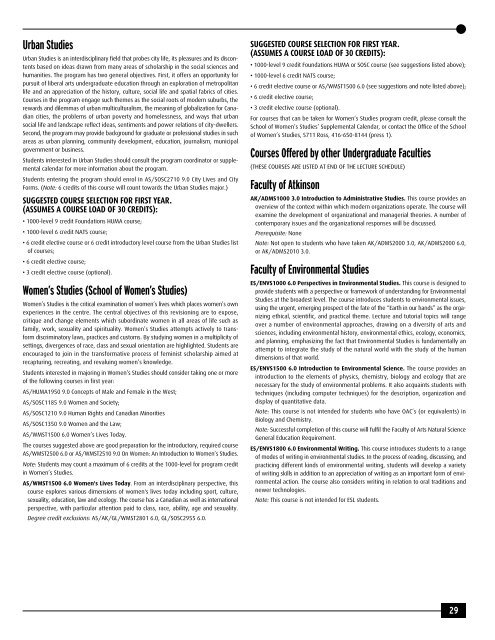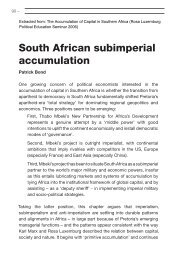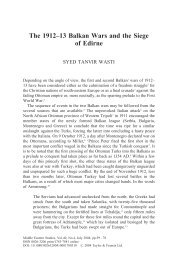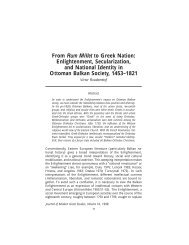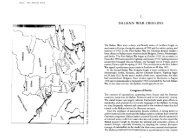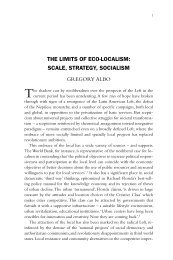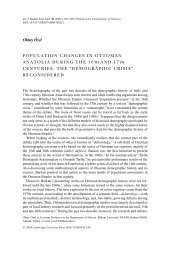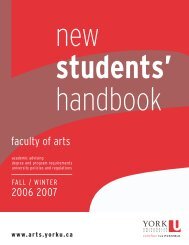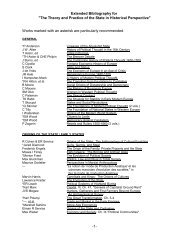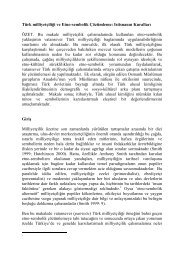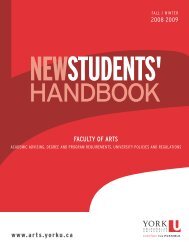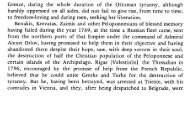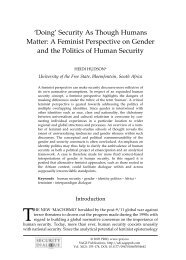FYCSG 05/06 REV2 - Faculty of Arts - York University
FYCSG 05/06 REV2 - Faculty of Arts - York University
FYCSG 05/06 REV2 - Faculty of Arts - York University
You also want an ePaper? Increase the reach of your titles
YUMPU automatically turns print PDFs into web optimized ePapers that Google loves.
Urban Studies<br />
Urban Studies is an interdisciplinary field that probes city life, its pleasures and its discontents<br />
based on ideas drawn from many areas <strong>of</strong> scholarship in the social sciences and<br />
humanities. The program has two general objectives. First, it <strong>of</strong>fers an opportunity for<br />
pursuit <strong>of</strong> liberal arts undergraduate education through an exploration <strong>of</strong> metropolitan<br />
life and an appreciation <strong>of</strong> the history, culture, social life and spatial fabrics <strong>of</strong> cities.<br />
Courses in the program engage such themes as the social roots <strong>of</strong> modern suburbs, the<br />
rewards and dilemmas <strong>of</strong> urban multiculturalism, the meaning <strong>of</strong> globalization for Canadian<br />
cities, the problems <strong>of</strong> urban poverty and homelessness, and ways that urban<br />
social life and landscape reflect ideas, sentiments and power relations <strong>of</strong> city-dwellers.<br />
Second, the program may provide background for graduate or pr<strong>of</strong>essional studies in such<br />
areas as urban planning, community development, education, journalism, municipal<br />
government or business.<br />
Students interested in Urban Studies should consult the program coordinator or supplemental<br />
calendar for more information about the program.<br />
Students entering the program should enrol in AS/SOSC2710 9.0 City Lives and City<br />
Forms. (Note: 6 credits <strong>of</strong> this course will count towards the Urban Studies major.)<br />
SUGGESTED COURSE SELECTION FOR FIRST YEAR.<br />
(ASSUMES A COURSE LOAD OF 30 CREDITS):<br />
• 1000-level 9 credit Foundations HUMA course;<br />
• 1000-level 6 credit NATS course;<br />
• 6 credit elective course or 6 credit introductory level course from the Urban Studies list<br />
<strong>of</strong> courses;<br />
• 6 credit elective course;<br />
• 3 credit elective course (optional).<br />
Women’s Studies (School <strong>of</strong> Women’s Studies)<br />
Women’s Studies is the critical examination <strong>of</strong> women’s lives which places women’s own<br />
experiences in the centre. The central objectives <strong>of</strong> this revisioning are to expose,<br />
critique and change elements which subordinate women in all areas <strong>of</strong> life such as<br />
family, work, sexuality and spirituality. Women’s Studies attempts actively to transform<br />
discriminatory laws, practices and customs. By studying women in a multiplicity <strong>of</strong><br />
settings, divergences <strong>of</strong> race, class and sexual orientation are highlighted. Students are<br />
encouraged to join in the transformative process <strong>of</strong> feminist scholarship aimed at<br />
recapturing, recreating, and revaluing women’s knowledge.<br />
Students interested in majoring in Women’s Studies should consider taking one or more<br />
<strong>of</strong> the following courses in first year:<br />
AS/HUMA1950 9.0 Concepts <strong>of</strong> Male and Female in the West;<br />
AS/SOSC1185 9.0 Women and Society;<br />
AS/SOSC1210 9.0 Human Rights and Canadian Minorities<br />
AS/SOSC1350 9.0 Women and the Law;<br />
AS/WMST1500 6.0 Women’s Lives Today.<br />
The courses suggested above are good preparation for the introductory, required course<br />
AS/WMST2500 6.0 or AS/WMST2510 9.0 On Women: An Introduction to Women’s Studies.<br />
Note: Students may count a maximum <strong>of</strong> 6 credits at the 1000-level for program credit<br />
in Women’s Studies.<br />
AS/WMST1500 6.0 Women's Lives Today. From an interdisciplinary perspective, this<br />
course explores various dimensions <strong>of</strong> women's lives today including sport, culture,<br />
sexuality, education, law and ecology. The course has a Canadian as well as international<br />
perspective, with particular attention paid to class, race, ability, age and sexuality.<br />
Degree credit exclusions: AS/AK/GL/WMST2801 6.0, GL/SOSC2955 6.0.<br />
SUGGESTED COURSE SELECTION FOR FIRST YEAR.<br />
(ASSUMES A COURSE LOAD OF 30 CREDITS):<br />
• 1000-level 9 credit Foundations HUMA or SOSC course (see suggestions listed above);<br />
• 1000-level 6 credit NATS course;<br />
• 6 credit elective course or AS/WMST1500 6.0 (see suggestions and note listed above);<br />
• 6 credit elective course;<br />
• 3 credit elective course (optional).<br />
For courses that can be taken for Women’s Studies program credit, please consult the<br />
School <strong>of</strong> Women’s Studies’ Supplemental Calendar, or contact the Office <strong>of</strong> the School<br />
<strong>of</strong> Women’s Studies, S711 Ross, 416-650-8144 (press 1).<br />
Courses Offered by other Undergraduate Faculties<br />
(THESE COURSES ARE LISTED AT END OF THE LECTURE SCHEDULE)<br />
<strong>Faculty</strong> <strong>of</strong> Atkinson<br />
AK/ADMS1000 3.0 Introduction to Administrative Studies. This course provides an<br />
overview <strong>of</strong> the context within which modern organizations operate. The course will<br />
examine the development <strong>of</strong> organizational and managerial theories. A number <strong>of</strong><br />
contemporary issues and the organizational responses will be discussed.<br />
Prerequisite: None<br />
Note: Not open to students who have taken AK/ADMS2000 3.0, AK/ADMS2000 6.0,<br />
or AK/ADMS2010 3.0.<br />
<strong>Faculty</strong> <strong>of</strong> Environmental Studies<br />
ES/ENVS1000 6.0 Perspectives in Environmental Studies. This course is designed to<br />
provide students with a perspective or framework <strong>of</strong> understanding for Environmental<br />
Studies at the broadest level. The course introduces students to environmental issues,<br />
using the urgent, emerging prospect <strong>of</strong> the fate <strong>of</strong> the “Earth in our hands” as the organizing<br />
ethical, scientific, and practical theme. Lecture and tutorial topics will range<br />
over a number <strong>of</strong> environmental approaches, drawing on a diversity <strong>of</strong> arts and<br />
sciences, including environmental history, environmental ethics, ecology, economics,<br />
and planning, emphasizing the fact that Environmental Studies is fundamentally an<br />
attempt to integrate the study <strong>of</strong> the natural world with the study <strong>of</strong> the human<br />
dimensions <strong>of</strong> that world.<br />
ES/ENVS1500 6.0 Introduction to Environmental Science. The course provides an<br />
introduction to the elements <strong>of</strong> physics, chemistry, biology and ecology that are<br />
necessary for the study <strong>of</strong> environmental problems. It also acquaints students with<br />
techniques (including computer techniques) for the description, organization and<br />
display <strong>of</strong> quantitative data.<br />
Note: This course is not intended for students who have OAC’s (or equivalents) in<br />
Biology and Chemistry.<br />
Note: Successful completion <strong>of</strong> this course will fulfil the <strong>Faculty</strong> <strong>of</strong> <strong>Arts</strong> Natural Science<br />
General Education Requirement.<br />
ES/ENVS1800 6.0 Environmental Writing. This course introduces students to a range<br />
<strong>of</strong> modes <strong>of</strong> writing in environmental studies. In the process <strong>of</strong> reading, discussing, and<br />
practicing different kinds <strong>of</strong> environmental writing, students will develop a variety<br />
<strong>of</strong> writing skills in addition to an appreciation <strong>of</strong> writing as an important form <strong>of</strong> environmental<br />
action. The course also considers writing in relation to oral traditions and<br />
newer technologies.<br />
Note: This course is not intended for ESL students.<br />
29


